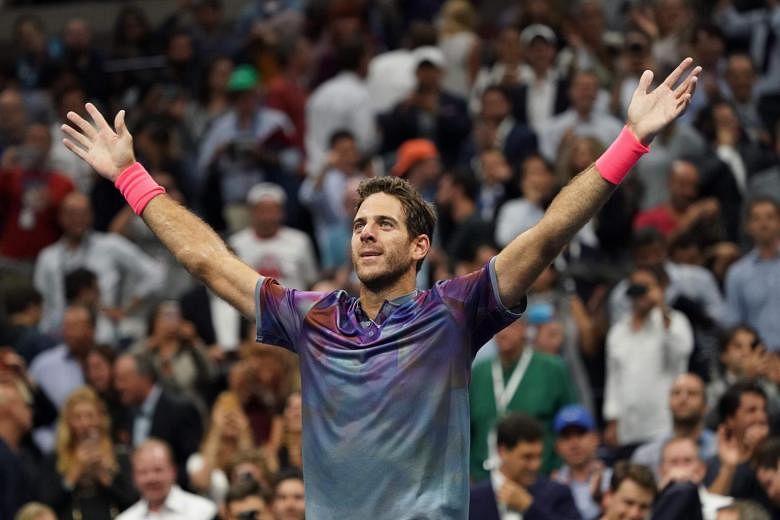Years ago a butterfly flutters onto court and sits on Juan Martin del Potro's hand as he readies to serve. Even though he is 1.98m and 97kg, perhaps the butterfly senses a kindred spirit in this gentle son of a veterinarian. Del Potro stills, he smiles, then he lifts his arm up and kisses the butterfly. The butterfly takes flight, whereupon the Argentinian - we're not sure, since the video clip ends - presumably hit a forehand that felled a tree.
This is the allure of del Potro - the fierce face, the agreeable manner and that forehand. Always that forehand. In the second point of the match a forehand winner. In the last point a forehand winner. An unmerciful stroke which conjures images of carpenters nailing coffins, executioners at work and boxers in a ring.
Boxers like Luis Firpo, the Argentinian nicknamed the Wild Bull of the Pampas, who in 1923 knocked the world heavyweight champion Jack Dempsey through the ropes and apparently onto a typewriter. In a sense it is what del Potro did to Roger Federer, in this case often using his forehand to knock the Swiss off the baseline and win their US Open quarter-final 7-5, 3-6, 7-6 (10-8), 6-4.
Everyone likes del Potro, even his rivals, even Federer, who said he "fought like a lion". Athletes admire resolve for they understand it clearest and see it in the Argentinian, in his comeback from four wrist surgeries, in his ability to keep stitching back together a tattered dream.
But it's not just that del Potro had a long wrestle with adversity. It's not just that when he won the US Open in 2009, only 20, with the muscle to scare anyone, his wrist gave in and he missed three Slams in 2010. It's not just that he returned to No. 5 in 2013 and then the wrist went again and he fell to No. 1045 and missed nine consecutive Slams from 2014-16.
No, it's that in the midst of all this, this rich vein of poor luck, this taunting by life, he never lost his humanity nor abandoned the lightness of spirit even as he played with intensity. He'd leap over a net once while playing against Federer, use a woman's phone in the crowd, run to find a bottle of water for a collapsing fan at Wimbledon and gave so much of himself to his matches that it made him weep. And sometimes us.
He leaned on Federer's shoulder and then cried after losing their classic 4hr 26min three-set Olympic semi-final in 2012 and got all teary when the US Open crowd regaled him last year with a chant of "Ole, Ole, Ole, Del Po, Del Po".
His emotion binds him to people for his manner reveals a gentle being, like the one we saw this summer when he comforted the injured Nicolas Almagro who had to retire mid-match and sat with him and ruffled his hair and later said: "I tried to find good words for that moment."
On court, nostrils flaring, eyes narrowing, there is a ferocity to del Potro, who plays as if this chance may never arrive again and thus everything of himself must be given to it. In 2013, he twisted his knee at Wimbledon but still went five majestic sets with Novak Djokovic. This Open, despite the flu, he returned from two sets down to beat Dominic Thiem.
Asked why people love him, he said: "They like one guy who never give ups (sic). You can see my backhand is not good enough yet, but I'm still trying. I think the people like that."
Federer did not. The Swiss played as if he was an instrument that had been poorly strung and was thus capable only of an uneven music. He seemed a fraction too late, played as if the net was an inch too high and looked like what he hasn't all year - a mid-30s player.
One smash which he could usually make when inebriated was driven into the net; one forehand volley which he's written textbooks on flew into another postcode. "I mean, that stuff sucked," he said.
At Wimbledon, in seven matches, he made 75 unforced errors; here in five matches he had 201. His numbers no longer added up and, later, speaking with a becoming honesty, he explained that he was undeserving of anything but an exit.
"I feel I have no place in the semis and he will have a better chance to beat Rafa. The way I played, it's not good enough in my opinion to win this tournament. It's better I'm out and somebody else gets a chance to do better than me."
To say Federer disappointed is to both speak a truth and be ungrateful. The beautiful problem of athletic genius is that eventually it cannot live up to the expectation it creates. Magicians are not allowed to run out of tricks. The Swiss' tennis this year has been almost absurd as he has rewritten the rules on sabbaticals and ageing, yet even he is allotted only a quota of miracles.
Del Potro will settle for just one. He will be tired, but as he faces the world No. 1 Nadal - whom he beat at the Olympics last year - he will be grateful that he is where tennis has not allowed him to be for large parts of his career: Big court, big rival, big occasion. Knowing the big softy with the big stick, one way or the other it will all end in tears.


